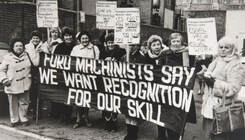 In this weeks blog we go behind the scenes with Lou Ellison, playing the lead role of Rita O'Grady in Made in Dagenham. With rehearsals in full swing, Lou tells us how she is hoping to do this iconic character justice, and which song she can't listen to without crying. Lou has been a member of Andover Musical Theatre Company for 18 years and this is her 7th lead role! Q:What drew you to the role of Rita O'Grady in "Made in Dagenham"? Portraying Rita O'Grady is a dream come true. I was lucky enough to see Gemma Arterton play the role in the West End too, and this has always been on my bucket list of roles! Rita's strength, resilience, and unwavering determination resonated with me deeply from the first time I watched the film. Rita is a working-class woman who finds her voice and leads a movement for equality, and I felt a strong connection to her journey. Q: How did you prepare for such a demanding role? Preparation for any role is intense but incredibly rewarding. For this show, we obviously have the challenge of doing the Essex accent which is quite fun so lots of time spent watching Youtube videos for the dialect, but we are also lucky to have the lovely Rachel, an authentic Essex girl, playing the role of Beryl, to help us! In rehearsals we have spent a lot of time exploring Rita's emotional journey and the complexities of her relationships with other characters in the story, and Eddie and I go through our lines, trying out different ways of saying things, according to the emotion of the moment. Outside of rehearsals, I like to learn my lines by recording them and listening whilst walking the dog. I also practice the singing with my vocal coach Lisa Faye Broadhead; she helps me with warms-ups and vocal exercises and planning how to approach the songs, especially the more challenging ones. Q: "Made in Dagenham" tackles important themes of gender equality and workers' rights. How do you think the production resonates with audiences today? The themes explored in "Made in Dagenham" are as relevant today as they were in the 1960s. The fight for gender equality and fair treatment in the workplace is an ongoing struggle, and the story of the Ford sewing machinists serves as a powerful reminder of the progress that has been made and the work that still needs to be done. I know I have worked in a number of places where women were treated like second class citizens, and there have been disparities in pay grades between men and women. Whether it's standing up against injustice, fighting for what you believe in, or finding strength in solidarity, there's something in the story of Made in Dagenham that resonates with everyone. Q: What has been the most rewarding aspect of portraying Rita O'Grady? Rita's is courageous and determined, and I've been deeply moved by her story, both as as a woman who has experienced similar mistreatment, but also as a mother; there is so much of her journey I can relate to. There has definitely been a lot of emotion in rehearsals; I can't listen to "The Letter" without shedding a tear, but there has been a lot of laughter too - the scenes with the factory girls have been really fun to do. Being part of a production with amtc is always rewarding, but for Made in Dagenham, it feels like everyone is working extra hard - we've already set the entire show and now have 6 weeks to keep drilling and perfecting it. I'm loving playing opposite my co-star Eddie Nias, we've been friends since I joined amtc 2006 and I really admire him as an actor. I've learnt so much from him during the rehearsal procosess and look forward to sharing the stage with him. Q: Finally, what message do you hope audiences take away from "Made in Dagenham"? I hope that audiences walk away from "Made in Dagenham" feeling uplifted, inspired and empowered to make a difference in their own lives and communities. Whether it's advocating for gender equality, standing up against injustice, or simply finding the courage to speak your truth, Rita's story reminds us that change is possible when we come together and fight for what we believe in. I also hope that the show serves as a celebration of the strength and resilience of working-class women throughout history. Their contributions often go unrecognized, but their stories deserve to be told and celebrated. Tickets for Made in Dagenham are on sale now. Book via ticket tailor or the lights. Our thanks to Parker Bullen solicitors, sponsors of Made in Dagenham.  As our cast are deep in rehearsals for Made in Dagenham, a show that addresses themese of inequality, particularly for women in the workplace, we thought it fitting to write a blog exploring the events that led to the women of the Ford Dagenham plant walking out on strike and the current state of play with regard to the gender pay gap. In 1968, the Ford Dagenham factory in the UK became the focal point of a significant movement for gender equality in the workplace, which eventually led to the passing of the Equal Pay Act. The story begins with the female workers at the Ford Dagenham plant, who were responsible for stitching car seat covers. Despite performing work of equal value to their male counterparts in other departments, they were classified as "unskilled" and paid significantly less. Fed up with this disparity, the women organised a strike in protest of the unfair treatment. Barbara Castle, the then UK Secretary of State for Employment and Productivity, played a crucial role in mediating the dispute between the striking women and Ford management. Castle recognized the injustice faced by these women and was determined to address the issue of pay inequality. She supported the demand for equal pay for equal work and became an advocate for the cause. Additionally, the Trades Union Congress (TUC), a federation of trade unions in the UK, threw its weight behind the Dagenham women's strike. The TUC recognized the broader implications of the fight for equal pay and offered its support to the striking workers. The strike garnered significant public attention and generated widespread support, putting pressure on both Ford and the government to take action. Ultimately, the strike played a pivotal role in the passage of the Equal Pay Act of 1970 in the UK Parliament. This landmark legislation made it illegal to pay women less than men for the same work or work of equal value. The Ford Dagenham strike and the subsequent passing of the Equal Pay Act marked significant milestones in the ongoing struggle for gender equality in the workplace, setting a precedent for future movements and legislation aimed at combating pay discrimination. International Women's Day, celebrated annually on March 8th, has served as a platform to highlight the social, economic, cultural, and political achievements of women while also calling attention to areas where progress is still needed. It reminds us of the ongoing fight for gender equality worldwide. In the UK, strides have been made since the passage of the Equal Pay Act, with more women entering the workforce, gaining access to education and leadership positions, and advocating for their rights. However, gender disparities persist in various sectors, including pay, representation in senior roles, and access to opportunities. Women still face challenges such as the gender pay gap, workplace discrimination, and underrepresentation in certain industries. The gender pay gap in the UK stands at around 15.5%, based on the Office for National Statistics (ONS) data. This figure represents the difference between the average hourly earnings of men and women across all jobs in the UK. However, it's important to note that the gender pay gap can vary depending on factors such as age, occupation, industry, and region. Similarly, on a global scale, while progress has been made in some regions, gender inequality remains a pervasive issue, with women disproportionately affected by poverty, violence, lack of access to education and healthcare, and limited economic opportunities. Efforts to address these inequalities continue through advocacy, policy changes, and grassroots movements aimed at promoting gender equality and empowering women worldwide. Made in Dagenham is on stage at The Lights theatre Andover, from Wednesday 22nd May through to Saturday 25th May 2024. BOOK NOW! |
Archives
April 2024
CategoriesAll Advertising Agm Amos Amos Awards Andover Andover Advertiser Andover Carnival Andover Sound Andover Vision Annie Auditions Awards Backstage Booking C Calamity Jane Carnival Casting Charity Children Christmas Christmas Ball Concert Concerts Curtain Call Awards December 2009 Esther Rantzen Events Face Painting Fame Free Concert Fundraising Gilbert & Sullivan Glee Jekyll & Hyde Lisa Faye Media Members Men Millie Movies Musicals Musical Theatre News Newsletter Open Day Paul Marsh Photos Pirates Of Penzance Pride Of Andover Productions Publicity Radio Raffle Winners Rehearsals Rehearsls Review Reviews Rogers And Hammerstein Scrooge Singing Sir George Young Social Events Sound Of Music Sponsorship Streisand Strictly Musicals Thanks Theatre The Lights The Likes Of Us The Mayflower The Mayor Of Test Valley The Pajama Game The Pirates Of Penzance The Sound Of Music The Witches Of Eastwick Tickets Training Vocal Coach Workshop Workshops Youth Theatre Zilliah Brooks |
amtc |
shows |
|



 RSS Feed
RSS Feed